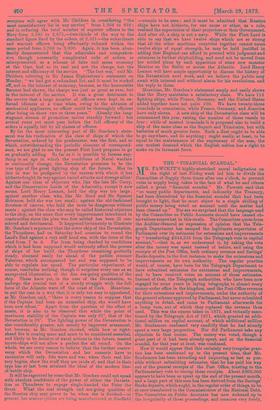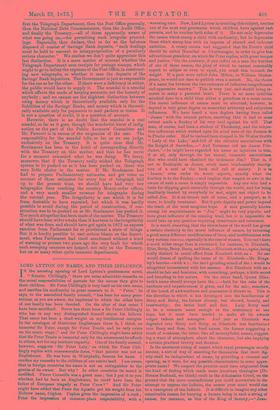THE "FINANCIAL SCANDAL."
TR. FAWCETT'S highly-stretched moral indignation on _Al the night of last Friday week led him to divide the
Committee of Supply three times after one o'clock, to prevent votes in supply being taken in the face of what he and others called a great "financial scandal." Mr. Fawcett said that "so many public departments, and indirectly the Treasury, had been discredited by the financial scandal that had been brought to light, that he must object to a single shilling of public money being voted on account until the matter had been cleared up." Nor are we surprised that the language used by the Committee on Public Accounts should have caused ob- servations somewhat in this strain. The Committee quote from the Auditor-General an expression of opinion that the Tele- graph Department has escaped the legitimate supervision of Parliament over its estimates for extensions and improvements by "transferring £644,936 from the Telegraph vote to capital account,"—that is, as we understand it, by taking the vote after the money was spent instead of before, and using the receipts of the Post Office, both ordinary revenue and Savings' Banks deposits, in the first instance, to make the extensions and improvements on its own authority. The regular practice would, of course, have been for the Telegraph Department to have submitted estimates for extensions and improvements, and to have received votes on account of those estimates. Instead of that, the Telegraph authorities, who have been now engaged for some years in laying telegraphs to almost every money-order office in the kingdom, used the Post-Office revenue for their extensions and improvements, under the authority of the general scheme approved by Parliament, but never submitted anything in detail, and came to Parliament afterwards for a lump vote, out of which they replaced the revenue thus used. This was the course taken in 1871, and virtually sanc- tioned by the Telegraph Act of 1871, which granted an addi- tional million on capital account, of which additional million Mr. Scadamore confessed very candidly that he had already spent a very large proportion. Nor did Parliament take any objection to that course. The money was voted, though a great part of it had been already spent, and so the financial scandal, for that year at least, was condoned.
Now it would appear that this certainly very irregular prac- tice has been continued up to the present time, that Mr. Scudamore has been extending and improving as fast as pos- sible without submitting estimates, that he has paid his way out of the general receipts of the Post Office, trusting to the Parliamentary vote to recoup those receipts. About £800,000 appears to have been so spent up the end of the present month, and a large part of this sum has been derived from the Savings' Banks deposits, which ought, in the regular order of things, to be at once transferred to the Commissioners of the National Debt. The. Committee on Public Accounts has now wakened up to the irregularity of these proceedings, and censures very freely, first the Telegraph Department, then the Post Office generally then the National Debt Commissioners, then the Audit Office and finally the Treasury,—all of them apparently aware o what was going on,—for permitting such irregular proceed ings. Especially, they declare, that so far as the balances disposed of consist of Savings' Bank deposits, "such dealings must be held to amount to misappropriation of a peculiarly serious character." We confess we don't quite appreciate this last distinction. It is a mere matter of account whether the Telegraph Department uses receipts for postage stamps, which ought to go to defray the expenses of the Post Office, in construct- ing new telegraphs, or whether it uses the deposits of the Savings' Bank depositors. The Government is just as responsible for the one as for the other. If there were a deficiency in either, the public would have to supply it. The scandal is a scandal which affects the mode of keeping accounts, not the honesty of anybody ; and we cannot see the slightest distinction between using money which is theoretically available only for the liabilities of the Savings' Banks, and money which is theoreti- cally available only for payments to mail packets or trains. It is not a question of credit, it is a question of account.
However, there is no doubt that the scandal is a real scandal, so far as it goes, though the wonderful burst of indig- nation on the part of the Public Accounts' Committee and Mr. Fawcett is in excess of the exigencies of the case. The responsibility for the scandal falls, so far as we can judge, exclusively on the Treasury. It is quite clear that Mr. Scudamore has been in the habit of corresponding directly with the Treasury on this matter, and that he has never for a moment concealed what he was doing. We fancy, moreover, that if the Treasury really wished the Telegraph system to be pushed on as it has been pushed on, there was very little choice in the matter. If Mr. Scudamore had had to prepare Parliamentary estimates, and get votes on account of these estimates for every line of telegraph laid up to the present time, we should have had very few telegraphic lines reaching the country Money-order offices, and a very much smaller revenue for telegraphs during the current year. The irregularity is one which it is far from desirable to have repeated, but which it was hardly possible to avoid during the period of construction, if con- struction was to be pushed on as Mr. Scudamore has pushed it. Too much altogether has been made of the matter. The Treasury should have been wider awake than it has been to the irregularity of what was done, and should have got again in 1872 an express sanction from Parliament for so provisional a state of things. But it is hardly possible to cast serious blame on the depart- ment, when Parliament had itself sanctioned without a word of warning or protest two years ago the very fault for which such sweeping censures are heaped, not only on the Treasury, but on so many other quite innocent departments,







































 Previous page
Previous page